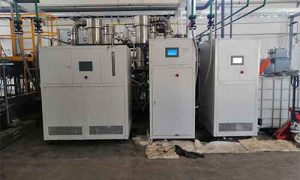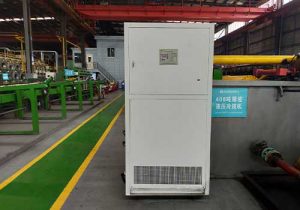refrigerant cooling system
Refrigerant Cooling System: An In-Depth Analysis
Definition of Refrigerant Cooling System
A refrigerant cooling system is a closed-loop system that uses a refrigerant as the primary medium for heat transfer. The refrigerant undergoes a phase change—evaporating and condensing—to absorb and release heat, thereby cooling the desired space or process. These systems are essential in air conditioning, refrigeration, and industrial processes.

Types of Refrigerant Cooling Systems
Refrigerant cooling systems can be categorized into direct expansion (DX) systems, where the refrigerant evaporates directly in the space to be cooled, and indirect systems, where the refrigerant circulates in a coil that transfers heat to a secondary fluid, such as water or glycol. Other types include centrifugal chillers, scroll chillers, and reciprocating chillers, each with its unique compressor technology and applications.
Working Principles of Refrigerant Systems
The basic working principle of a refrigerant cooling system involves four main components: a compressor, a condenser, an expansion valve, and an evaporator. The refrigerant flows through these components in a cycle, changing its state from liquid to gas and back, transferring heat from one point to another. The refrigerant absorbs heat at the evaporator, is compressed in the compressor, releases heat at the condenser, and then expands in the expansion valve, ready to absorb heat again.

Market Trends in Refrigerant Cooling Systems
Market trends indicate a growing demand for energy-efficient and environmentally friendly refrigerant cooling systems. The European Union and other regions are implementing regulations that require low global warming potential (GWP) refrigerants in household refrigeration systems. This has led to the development and use of more sustainable refrigerants, such as natural refrigerants with low GWP, and the phasing out of high-GWP refrigerants.
Efficiency of Refrigerant Cooling Systems
Efficiency in refrigerant cooling systems is often measured by the coefficient of performance (COP), which is the ratio of the heat transferred to the compressor work input. High-COP systems are more energy-efficient. Modern systems are designed to maximize efficiency, with features like variable speed drives for compressors and electronic temperature control valves for precise regulation of refrigerant flow.
Environmental Impact of Refrigerant Cooling Systems

The environmental impact of refrigerant cooling systems is primarily related to the choice of refrigerant. High-GWP refrigerants contribute significantly to greenhouse gas emissions. Therefore, there is a global shift towards using low-GWP refrigerants, such as carbon dioxide (CO2), hydrocarbons (HC), and their mixtures, which are more environmentally friendl.
Sustainability of Refrigerant Systems
Sustainability in refrigerant cooling systems is achieved by using refrigerants with zero ozone depletion potential (ODP) and low GWP, as well as by improving system efficiency. The use of phase change materials (PCMs) in refrigeration systems is also considered a promising option for enhancing energy efficiency and reducing environmental impact.
Conclusion
Refrigerant cooling systems are fundamental to modern society, providing essential cooling for a variety of applications. As technology advances and environmental regulations tighten, there is a clear trend towards more energy-efficient and sustainable systems. Understanding the different types, working principles, and market trends of refrigerant cooling systems is crucial for selecting the most appropriate and environmentally friendly solution for any given application.
Related recommendations
chiller kw
398Understanding Chiller kW The "kW" in chiller kW indicates the cooling capacity of the chiller system, measured in kilowatts. This is a crucial specification as it directly affects the chiller's...
View detailsHow to deal with the low evaporation pressure of the water-cooled chiller?
1408How to Deal with the Low Evaporation Pressure of the Water Cooled Chiller? The evaporation pressure of the water-cooled chiller may be too low due to insufficient refrigerant. Therefore, as l...
View detailswater cooled process chiller
717Water-Cooled Chilling Plant: Efficient Temperature Control for Industrial Applications Water-cooled chilling plants are essential in various industries for their ability to provide precise and ...
View detailsWhat are the Requirements for Adding Refrigerant to Industrial Chillers?
1686What are the Requirements for Adding Refrigerant to Industrial Chillers? After the industrial chiller has passed the vacuum test, if there is no problem, then the refrigerant can be added, bu...
View details
 LNEYA Chiller
LNEYA Chiller







HelloPlease log in